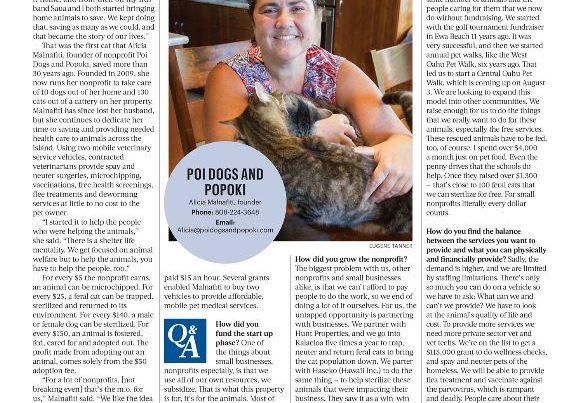Honolulu Star-Advertiser
November 25, 2019
by NINA WU / photos by JAMM AQUINO
Bikeshare Hawaii, founder of Honolulu’s first bikeshare system, is looking toward the future with an eye on electric bikes.
The nonprofit currently has a prototype by PBSC Urban Solutions on island to test out on Honolulu streets, with the hopes of adding it to the Biki fleet in its next phase of expansion. The eBiki electric bike is green, goes up to about 14 mph and has about a 40-mile range.
The goal, according to Executive Director Todd Boulanger, is to broaden options for users of the bikeshare system. More people might consider riding a Biki if they have the pedal-assist technology, he said, while existing users might be able to travel farther or consider uphill routes.
“By adding electric bikes to bikeshare fleets, just like adding electric cars to carsharing fleets, it’s one way for a mass audience or more people to have access and try out a technology,” said Boulanger. “So in many ways, adding electric bikes to a bikeshare fleet basically makes the technology more approachable.”
The electric bikes might appeal to folks who live in the back of Palolo Valley, he said, as well as those hesitant about their fitness levels and those who have range anxiety about pedaling as far as they might need to go.
Biki data currently shows that more riders rent a bike to go downhill than up a hill. Costs for electric bikes have also come down in recent years, making them more attractive.
In Montreal the public bikeshare system, BIXI Montreal, recently added 120 electric bikes from PBSC Urban Solutions to its network as part of a pilot project.
“So electrification and electric stations cost more than our existing stations, but based on the track record of other bikeshare programs, we would probably see a doubling or tripling of use of bikes,” he said.
Still, the addition is more than a year away from becoming a reality.
Bikeshare Hawaii faces some uphill battles ahead, given that the Honolulu City Council in September adopted a resolution seeking to end the free use of city sidewalks and property for Biki stops.
The resolution, authored by Councilwoman Heidi Tsuneyoshi, wants the nonprofit to pay the city rent per square foot for the use of those properties. Another resolution seeks an audit of the city and its relationship with the nonprofit.
Also, a Council bill under consideration seeks to establish a fee permit system for shared micromobility fleets such as Biki or push scooters to use public parking stalls and other areas.
Boulanger said Biki’s existing contract with the city determines where it operates, and that Bikeshare Hawaii will work with the city regarding any new regulations.
But any additional fees in the future would likely require a reevaluation of Biki stop locations, he said, which could mean consolidating the ones available, along with the potential scaling back of other services.
The nonprofit does not currently pay any landowner — public or private — rent for the placement of Biki stops. Boulanger said this is typical for docked bikeshare systems throughout the U.S.
In June 2017 Bikeshare Hawaii launched Biki with $2 million in startup funds from the city and state. Despite a few hiccups at the start, the bikeshare has been successful, and at its two-year mark, became the sixth most used bikeshare system in the nation.
Today it offers approximately 1,300 bicycles at 136 Biki stops from Diamond Head to downtown, and logs more than 100,000 rides a month. The newest stop was installed in September at Manoa Marketplace.
Bikeshare Hawaii, a nonprofit, manages the system in partnership with the city and state, but Secure Bike Share Hawaii, a for-profit entity, made the initial investment in the Biki bikes and runs day-to-day operations.
Some challenges that will need to be addressed include the logistics of recharging the eBiki, said Boulanger. The eBiki could use existing docks but would then need to be brought back to headquarters for recharging. A PBSC bikeshare electric station, which could recharge up to 30 e-bikes in four hours, might be more efficient.
Biki statistics
>> Total trips: (Year 1) 838,662, (Year 2) 1,247,251
>> Total riders: (Year 1) 95,530, (Year 2) 116,545
Biki demographics
Members (meaning regular users with a plan)
>> 44% female (compared with 34% nationally)
>> 35%, ages 18 to 34; 32% are 35 to 45; 21% are 50 and older
>> 27% said they lost weight
Biki trivia
>> The busiest time of day is 3 to 5 p.m.; busiest day is Friday
>> Busiest Biki stop is No. 321, Seaside and Kalakaua avenues in Waikiki
>> Average ride time: 19 minutes and 21 seconds
Source: Bikeshare Hawai







